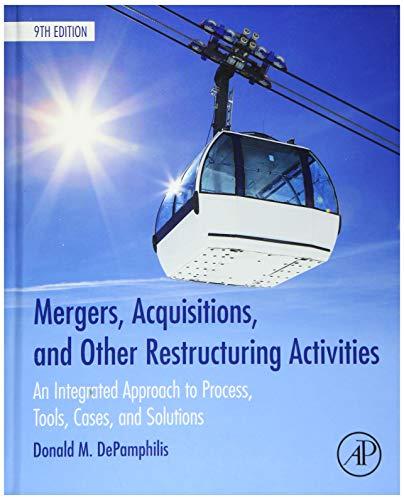Question
SUN COMPANY The Sun Co. was founded five years ago by three former Moon Company employees. The three founders own 100% of the Sun Companys
SUN COMPANY
The Sun Co. was founded five years ago by three former Moon Company employees. The three founders own 100% of the Sun Companys stock which has a market value of $5 per share. Below is the Balance Sheet of the company.
The boards of directors of Sun Company have asked Frank Norman, the financial officer of the company, to make the first major decision for the company's future financial planning.
The board has asked Frank to evaluate the profitability of two new investments (Table 1) that the company considers acquiring for its future survival.
The two investments are different in their characteristics and descriptions.
| Table 1 | Investment A | Investment B |
| Purchase Price | $2,000,000 | $4,000,000 |
| Output | 2,500 | 2,500 |
| Growth in Output | 5% | 6% |
| Variable Cost | $400 | $400 |
| Growth in Costs | 3% | 3% |
| Unit Price | $1,000 | $1,500 |
| Price Increase | 4% | 4% |
| Beta | 1 | 1.4 |
| Tax Rate | 40% | 40% |
The investments would be depreciated on a straight-line basis over their five-year life to a zero-salvage value.
Frank Norman, being a sophisticated financial analyst, obtained the following information in Table 2 for the analysis of various investment and financial proposals.
| Table 2 | Expected Return | Variance | Covariance with Market Return |
| Risk-Free Rate | 10% | ||
| Market Portfolio | 20% | ||
| SUN CO. | 8% |
Part I
What is the cost of capital for each investment?
2. Which of the two investments should be adopted? Why?
-
What would be the Suns cost of capital if these two investments are adopted?
4. Based on the expected rate of return of each investment which investment should be accepted? Why?
***********************************PLEASE ANSWER PART II Only
Part II
The financial officer has long believed that Sun's capital structure is not optimal, and he believes by financing half of total investment of each investment by debt at the 10% and retires the debt over the life of the investment, the value of each investment will be maximized. If Frank Norman is correct with his assumptions and if his financial plan is adopted, what would the following be?
-
What is the Adjusted Present Value (APV), for each investment?
2. What would be the value of each investment based on the Weighted Average Cost of Capital (WACC)?
-
What is the Cash Flow-to-Equity (FTE) for each investment?
-
Explain the differences among the three methods for the level of debt financing.
| Sun Company -Balance Sheet (in thousands) | |||
| Cash | $100,000 | Accounts Payable | $150,000 |
| Account Receivable | $300,000 | Notes Payable | $50,000 |
| Inventory | $250,000 | Accrued Wages | $75,000 |
| Current Assets | $650,000 | Current Liabilities | $275,000 |
| Gross Fixed Assets | $1,850,000 | Common Stocks (1M shares at par value of $1.5) | $1,500,000 |
| less: Accumulated | |||
| Depreciation | ($300,000) | Retained Earnings | $425,000 |
| Net Fixed Assets | $1,550,000 | Equity | $1,925,000 |
| Total Assets | $2,200,000 | Total Debt & Equity | $2,200,000 |
***********************************PLEASE ANSWER PART II Only
Step by Step Solution
There are 3 Steps involved in it
Step: 1

Get Instant Access to Expert-Tailored Solutions
See step-by-step solutions with expert insights and AI powered tools for academic success
Step: 2

Step: 3

Ace Your Homework with AI
Get the answers you need in no time with our AI-driven, step-by-step assistance
Get Started


